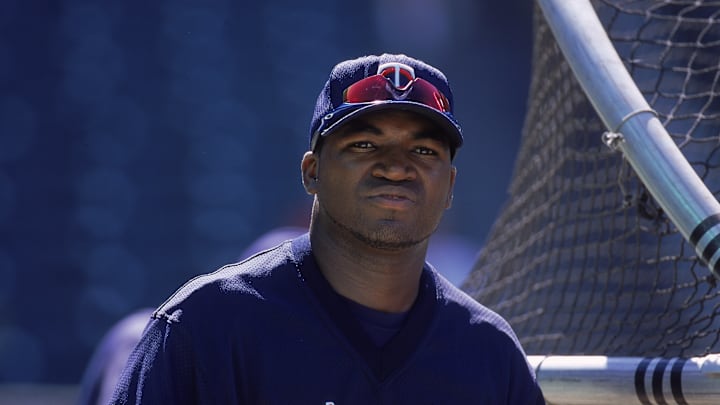The Minnesota Twins were a team on the rise following the 2002 season, coming off their first American League Championship Series appearance since winning the World Series in 1991. But a few months after the season ended, they made one of the biggest gaffes in franchise history.
The Twins released designated hitter David Ortiz on Dec. 16, 2002, in a move that seemed harmless at the time. But when Ortiz signed with the Boston Red Sox a few weeks later, it became a seismic transaction that not only altered the Twins’ history but changed the course of Major League Baseball.
David Ortiz had a star-crossed tenure with the Minnesota Twins
Ortiz began his professional career in 1992 when he signed as an international free agent from the Dominican Republic. After making his professional debut for the Mariners in the 1994 Arizona Fall League, Ortiz established himself as one of Seattle’s best hitting prospects in 1996, hitting .322/.390/.511 with 18 homers and 93 RBI for the Low-A Wisconsin Timber Rattlers and even beating Alex Rodriguez in a home run derby that summer.
After the 1996 season, Ortiz was traded to Minnesota in a deal that sent Dave Hollins to Seattle and Ortiz went on to make his MLB debut in September 1997. Ortiz didn’t stick with the Twins right away and didn’t get his first full seasons in the majors unti the 2000 season, when he hit .282/.364/.446 with 10 homers and 63 RBI in 130 games.
Ortiz had a fast start in 2001 before a broken wrist put him on the injured list and Ortiz battled a knee injury through the first half of the 2002 season until hitting .297/.363/.572 with 15 homers and 42 RBI over 65 games in the second half.
Ortiz’s hot performance helped the Twins win their first division title since 1991 and overcome a 2-1 deficit to defeat the Oakland Athletics in five games in the 2002 American League Divisional Series. But Ortiz’s history of injuries and the presence of top prospect Matthew LeCroy convinced the Twins to non-tender him that December and made him a free agent.
David Ortiz’s release changed MLB history
Just over a month after Ortiz was released, he signed with a one-year, $1.25 million contract with incentives to join the Red Sox. Wearing No. 34 in honor of his mentor, Kirby Puckett, Ortiz entered a log jam at first base and designated hitter that included Red Sox legends Kevin Millar and Manny Ramirez but started to take off and finished his first season in Boston hitting .288/.369/.592 with 31 homers and 101 RBI in 128 games while finishing fifth in the American League Most Valuable Player voting.
Ortiz’s legend grew after making his first All-Star appearance and finishing fourth in MVP voting in 2004. But his biggest impact was a walk-off home run in Game 4 of the 2004 American League Championship Series against the New York Yankees, which helped overcome a 3-0 series deficit and lead Boston to win their first World Series since 1918, breaking The Curse of the Bambino.
Ortiz went on to play 20 seasons, hitting .286/.380/.552 with 541 home runs and 1,768 RBI over his career. He was a 10-time All-Star, seven-time Silver Slugger Award winner and three-time World Series champion and was inducted into the National Baseball Hall of Fame in 2022. His No. 34 is also retired by the Red Sox and his presence remains throughout the city of Boston thanks to his nickname, “Big Papi.”
What if the Minnesota Twins had kept David Ortiz?
While the Red Sox benefitted greatly, the decision to release Ortiz remains one of the biggest “What ifs” in franchise history. The Twins were an ascending team with Torii Hunter, Joe Mauer, Justin Morneau and Johan Santana leading the way and the presence of Ortiz would have at least prevented the Twins’ 18-game postseason losing streak, which is the largest in the history of North American sports and didn’t end until 21 years after Ortiz’s release.
You could even wonder if Ortiz would have fit into the Twins’ small-ball approach under manager Ron Gardenhire but this is one of the most legendary sluggers in the history of baseball. Ortiz probably would have figured it out and the legendary slugger could have been a force in the middle of the Minnesota lineup instead of tormenting the Twins with a .332/.408/.636 batter’s line with 21 home runs and 58 RBI in 73 career games.
This makes releasing Ortiz one of the biggest blunders in franchise history and one of the most important events in the history of baseball.
